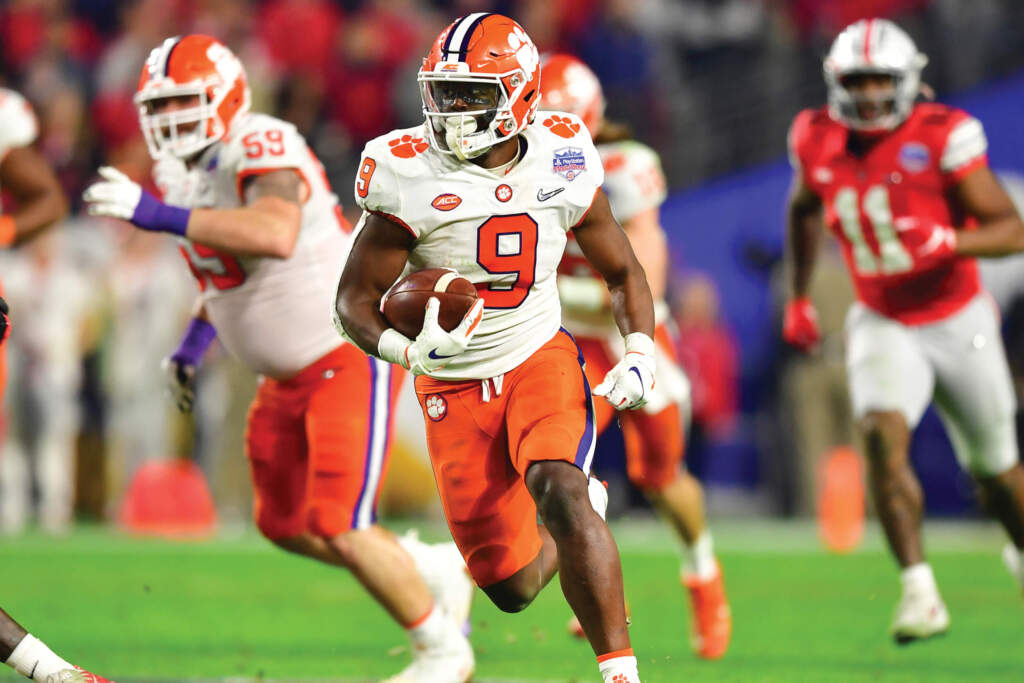Note: The following appears in the App State football gameday program.
Today, we honor the Clemson teams celebrating their 50th, 25th, 10th and fifth anniversaries. We appreciate their contributions to the heritage of Clemson football. Below are some season highlights.
1974
50-Year Anniversary
Our 50-year anniversary team was Clemson’s winningest squad between 1960-76. While Frank Howard’s teams from 1965-67 all won the ACC title, they did so by winning just six overall games each season.
Teams played just 10 games in those days, and the ACC suffered from the “800 rule,” a by-law adopted in 1960 that was in effect until 1972 that prohibited ACC teams from accepting student-athletes who did not make at least a 750 on the SAT between 1960-64, and an 800 between 1964-72. Other conferences, such as the SEC, did not have such a rule. It gave other conferences a recruiting advantage over ACC institutions. The rule ended in 1972, and it allowed ACC schools to pursue a wider talent pool.
Clemson began the 1974 season with two losses to ranked teams Texas A&M and NC State. But the Tigers won seven of their last nine games, including all six games at home. That home record included wins over Georgia and Georgia Tech in consecutive weeks, the first time since 1914 that Clemson beat both programs in the same year.
The offense featured a strong running attack, led by freshman Ken Callicutt, who had 809 rushing yards, a 5.0-yard average and five rushing touchdowns. He was a capable receiver out of the backfield, and that made the Clemson offense diversified under Head Coach Red Parker.
Mark Fellers and Mike O’Cain held down the quarterback position. Fellers had 10 passing touchdowns against five interceptions. His 142.1 pass efficiency rating was second highest in Clemson history at the time.
The signal-callers benefited from the natural abilities of junior tight end Bennie Cunningham, who led the Tigers with 24 receptions for 391 yards and seven touchdowns. He was a first-team All-American that year before being a first-round draft pick of the Steelers in 1976. Cunningham was the only tight end to make the ACC 50-Year Anniversary Team in 2002.
The season closed with four consecutive wins for the first time since 1967, including victories over North Carolina (54-32) and South Carolina (39-21).
Callicutt set a school record (which has since been eclipsed) with 252 all-purpose yards, 197 rushing and 55 receiving, against the Gamecocks. The defense was led by middle guard Willie Anderson, who finished with 21 tackles, still the Tiger record by a defensive interior lineman, and was named national defensive player-of-the-week by Sports Illustrated.
It was a fitting performance by Anderson, who four years earlier had won a court case against the ACC that led to the ending of the “800 rule.”
Clemson finished the year with a 7-4 record and 4-2 ACC mark, good for second place. There were only 11 bowl games in 1974, so the Tigers were left out of the postseason picture. That 1974 team certainly would be a bowl team by today’s landscape, where over 80 teams receive bowl bids.
1999
25-Year Anniversary
Our 25-year anniversary team began a new era in Clemson football. It was the first year of the Tommy Bowden tenure, an era that brought the program to a new level of consistency and set the table for the program’s national success under Head Coach Dabo Swinney.
Bowden brought a wide-open offense that set many records, especially in the passing game. He brought many of the organizational theories and offensive strategies that had led to great success for his father, Bobby Bowden, at Florida State.
The season began with a 13-10 loss to Marshall, a defeat that did not look good at the time, but the Thundering Herd went on to finish with a 13-0 record and No. 10 final ranking in both polls. Clemson would be the team that came closest to beating Marshall all season.
The 33-14 win over Virginia in week two showed Tiger fans what the offense was capable of. The Cavaliers were ranked in the top 25 of both polls, but the Tigers put on a strong passing game behind Brandon Streeter.
Streeter connected on 24-32 passes for 343 yards and two touchdowns, as he led the Clemson offense to 447 yards and was named national player-of-the-week by USA Today.
Clemson jumped out to a 33-0 lead in the first 36 minutes and had 407 yards through three quarters. The late Brian Wofford had eight receptions for 143 yards and a touchdown to lead the wide receivers.
Bowden’s first Clemson win included a strong defensive performance, led by Keith Adams and Braxton K. Williams. Adams had a then career-high 16 tackles. Adams went on to accumulate a Tiger-record 186 tackles in 1999, including a school-record 35 tackles for loss.
Clemson lost at No. 8 Virginia Tech 31-11 in a game that was much closer than that, then the Tigers won four of their next six games, including a 31-20 win over North Carolina when Clemson had 236 rushing yards and 208 passing yards. Woodrow Dantzler took over for Streeter, who was injured, and led Clemson to the win.
Dantzler received national attention two weeks later at Maryland in a 42-30 victory. He had 435 total yards, as the Tigers broke a seven-game losing streak on the road. Dantzler had 183 rushing yards and 252 passing yards in the first of a Clemson-record 11 career games with 100+ rushing yards and 300+ total yards.
The following Saturday on Oct. 23, Clemson was the epicenter of the college football world when it faced Florida State in the first meeting in Division I history of father-and-son head coaches.
In addition to the father vs. son coaching confrontation, Florida State was ranked No. 1 in the nation. Clemson had a 14-3 halftime lead, but the Seminoles came back to take a 17-14 lead with 5:26 left.
Dantzler led Clemson on a comeback, but a 41-yard field-goal attempt by Tony Lazzara was tipped at the line of scrimmage and the Seminoles hung on for the narrow victory. It was the closest game all year for Florida State, who ended the season by defeating Virginia Tech to claim the national championship.
Clemson finished the season with a 6-6 record while playing the nation’s toughest schedule.
2014
10-Year Anniversary
The 10-year anniversary team of 2014 had 10 wins, the fourth straight year the program reached that level of excellence.
It was a team that was solid on offense, but the defense was among the best in school history. Clemson led the nation in total defense (260.8), just the second Tiger team to lead the country in that category.
That was one of nine defensive categories that Clemson led the nation. Brent Venables’ defense also led the nation in yards per play allowed (4.0), first downs allowed per game (14.2), third-down conversion percentage (27.4), tackles for loss per game (10.1) and pass efficiency defense (98.3).
Vic Beasley led the defense and was a first-team All-American. The senior finished his career with 33 sacks, most in school history. Beasley was one of three Tiger defenders to earn First-Team All-ACC honors.
First-round NFL draft pick Stephone Anthony and Grady Jarrett, who is still starting in the NFL, also earned First-Team All-ACC honors. Garry Peters was the most-honored defensive back with a Second-Team All-ACC selection.
The offense was young, but it had many outstanding performances. Cole Stoudt started the season at quarterback, but after a 1-2 start, freshman Deshaun Watson moved into the lineup. Watson threw a Clemson-record-tying six passing touchdowns in his first start, a 50-35 win over North Carolina.
Clemson suffered three losses on the season, at Georgia to open the season, in overtime, at defending national champion Florida State and at Georgia Tech in the 10th game of the year.
Watson was injured in that Georgia Tech game, and the injury was later determined to be a torn ACL.
Despite that injury, Watson came back two weeks later to start against South Carolina. The Tigers had lost five in a row to the Gamecocks, and this 35-17 win turned out to be one of the most important wins in the Swinney era.
Watson completed 14-19 passes for 269 yards and two touchdowns. He completed seven passes for 185 yards and two touchdowns to Artavis Scott, and Wayne Gallman had 191 yards on 27 carries. It marked the first time Clemson had a 180-yard rusher and 180-yard receiver in the same game. Scott’s receiving-yardage figure was the most against the Gamecocks in Tiger history.
The season ended in a dominating 40-6 win over a top-20 Oklahoma team in the Russell Athletic Bowl. Scott scored on a 65-yard touchdown pass from Stoudt on Clemson’s first offensive play, the first Tony Elliott called as offensive coordinator. Later in the first quarter, Ben Boulware had a 47-yard interception return for a touchdown to give Clemson a 17-0 lead.
Stoudt was named MVP after completing 26-39 passes for 319 yards and three touchdowns. The victory gave Clemson great momentum for the 2015 season, the first of six consecutive College Football Playoff seasons.
2019
Five-Year Anniversary
One could easily make the case that our five-year anniversary team, the 2019 squad, is the best in school history that did not win a national championship. Clemson won its first 14 games on the way to a 14-1 record. The team outscored the opposition on average by a 44-13 score. The offense, co-coordinated by Elliott and Jeff Scott, averaged 240 rushing yards per game and 288 passing yards per game, the only team in school history to average 240+ yards per game in each category.
ACC Player-of-the-Year Travis Etienne had 1,614 rushing yards and 19 touchdowns while averaging 7.8 yards per carry. Sophomore Trevor Lawrence completed 66 percent of his passes for 3,665 yards and 36 touchdowns. Tee Higgins had 59 catches for 1,167 yards and 13 touchdowns, while Justyn Ross had 66 receptions for 865 yards and eight touchdowns.
Defensively, Isaiah Simmons was a unanimous first-team All-American and won the Butkus Award. He had a team-high 107 tackles, 16 tackles for loss, eight sacks, three interceptions and 10 pass breakups in what many believe is the best all-around defensive season in Tiger history.
Clemson won its first 14 games, and 12 were by at least two touchdowns. A 21-20 win at North Carolina and a 29-23 victory over Ohio State in the Fiesta Bowl (CFP semifinal) were the only games decided by a touchdown or less.
The win over Ohio State was among the best CFP games to date. Lawrence led Clemson on a 94-yard drive with under two minutes left. He connected with Etienne on a 34-yard touchdown pass with 1:49 left to give Clemson a 29-23 lead. Nolan Turner then intercepted a Justin Fields pass in the endzone with 37 seconds left to clinch the win.
Clemson’s most dominant performance might have come in the ACC Championship Game, a 62-17 victory over No. 22 Virginia. It was the largest margin of victory over a ranked team in Tiger history. It gave the Tigers their fifth consecutive ACC title, as Clemson became the first program to win five straight conference title games.
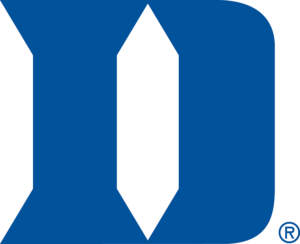 Duke
Duke
 Duke
Duke
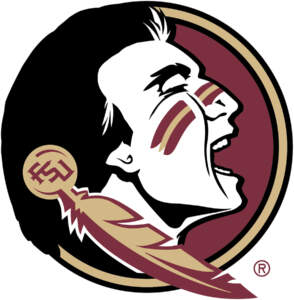 Florida State
Florida State
 Florida State
Florida State
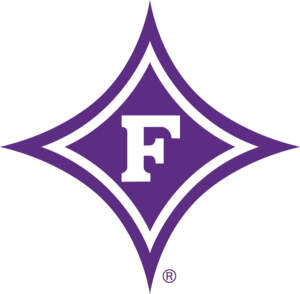 Furman
Furman
 Furman
Furman
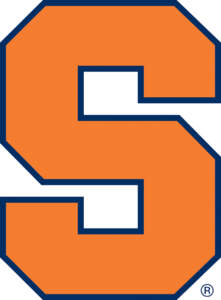 Syracuse
Syracuse
 Syracuse
Syracuse
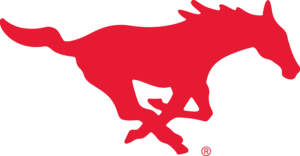 SMU
SMU
 SMU
SMU
 Duke
Duke
 Duke
Duke
 Florida State
Florida State
 Florida State
Florida State
 Furman
Furman
 Furman
Furman
 Syracuse
Syracuse
 Syracuse
Syracuse

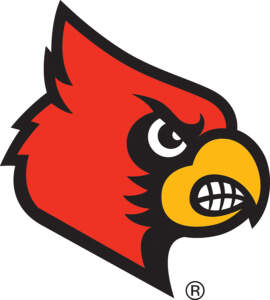 Louisville
Louisville 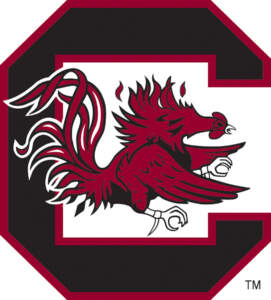 South Carolina
South Carolina  LSU
LSU 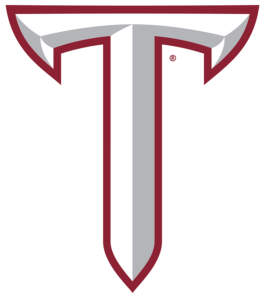 Troy
Troy 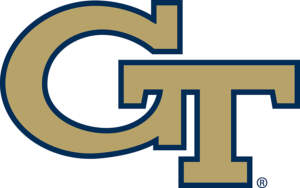 Georgia Tech
Georgia Tech 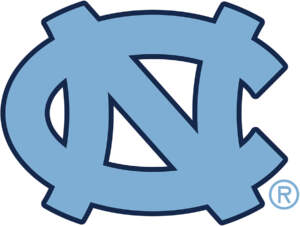 North Carolina
North Carolina 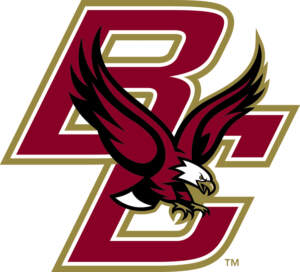 Boston College
Boston College 

